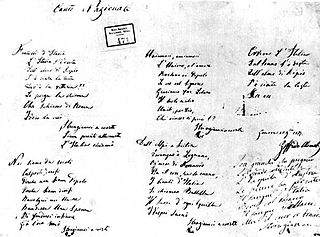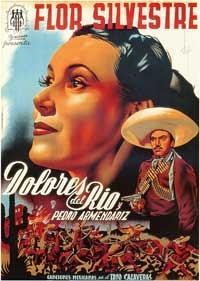See also
| This page lists people with the surname Novaro. If an internal link intending to refer to a specific person led you to this page, you may wish to change that link by adding the person's given name(s) to the link. |
Novaro is a surname, and may refer to:
| This page lists people with the surname Novaro. If an internal link intending to refer to a specific person led you to this page, you may wish to change that link by adding the person's given name(s) to the link. |

"Il Canto degli Italiani" is a canto written by Goffredo Mameli and set to music by Michele Novaro in 1847, and is the current national anthem of Italy. It is best known among Italians as the Inno di Mameli, after the author of the lyrics, or Fratelli d'Italia, from its opening line. The piece, a 4/4 in B-flat major, consists of six strophes and a refrain that is sung at the end of each strophe. The sixth group of verses, which is almost never performed, recalls the text of the first strophe.

Mexican cinema dates to the late nineteenth century during the rule of President Porfirio Díaz. Seeing a demonstration of short films in 1896, Díaz immediately saw the importance of docoumenting his presidency in order to present an ideal image of it. With the outbreak of the Mexican Revolution in 1910, Mexican and foreign makers of silent films seized the opportunity to document its leaders and events. From 1915 onward, Mexican cinema focused on narrative film.

Michele Novaro was an Italian composer.
Pablo Marcos Ortega, known professionally as Pablo Marcos, is a comic book artist and commercial illustrator best known as one of his home country's leading cartoonists and for his work on such popular American comics characters as Batman and Conan the Barbarian, particularly during the 1970s. His signature character was Marvel Comics' the Zombie, for which Marcos drew all but one story in the black-and-white horror-comics magazine Tales of the Zombie (1973–1975).
Centro Universitario de Estudios Cinematográficos (CUEC) was founded in 1963 as part of the National Autonomous University of Mexico. It was influenced by the Nouvelle Vague and by the First Contest of Experimental Film organized in Mexico that year.
Octavio Augusto Novaro Peñalosa was a prominent theoretical physicist specialized in theoretical catalysis, physical chemistry, biophysics and geophysics. He received the National Prize for Arts and Sciences in 1983 and became the first Mexican researcher to receive the UNESCO Science Prize in 1993. Since 1995 he was also one of the forty lifetime members of The National College.

L'incoronazione di Dario is a dramma per musica by Antonio Vivaldi with an Italian libretto by Adriano Morselli. The opera was first performed at the Teatro Sant'Angelo in Venice on 23 January 1717.

Wild Flower is a 1943 Mexican historical film directed by Emilio Fernández and starring Dolores del Río and Pedro Armendáriz. It is the first Mexican movie of Dolores del Río after her career in Silent and Golden Age's Hollywood films. It's the first movie of an extended collaboration between Fernández-Del Rio-Armendáriz, Gabriel Figueroa (cinematography) and Mauricio Magdaleno (writer). It also marked the debut of Emilia Guiú in a small role as an extra. The film is considered one of the defining films of the Golden Age of Mexican cinema.
Sergio De La Torre is a Mexican photographer, filmmaker and performance artist who teaches photography and film at the University of San Francisco. De La Torre is originally from the Tijuana/San Diego border and migrated to San Francisco. He is the co-founder of the performance group Los Tricksters who perform at various street fairs, academic conferences, art galleries and film festivals.

The Incredible Invasion is a 1971 Mexican horror film directed by Juan Ibáñez. It stars Boris Karloff and Enrique Guzmán.
La Heredera is a Mexican telenovela produced by TV Azteca. It marked the third reunion for Silvia Navarro and Sergio Basañez as protagonists. The series was then developed into an American telenovela by the title of American Heiress.
The Children of Maria Morales is a 1952 Mexican film. It was directed by Fernando de Fuentes.
Tres citas con el destino is a 1954 Mexican film directed by Fernando de Fuentes.

Where were you last Pluterday? is a science fiction novel by Paul van Herck, originally released in Dutch in 1968 as Sam, of de Pluterdag by J.M. Meulenhoff and released in English by DAW books in 1973.

María Novaro is a Mexican film director. She was among the first generation of female filmmakers to graduate from a film school in Mexico. She has made five feature films and fourteen short films. Within the Mexican film industry, she has been a cinematographer, sound mixer, director, screenwriter and editor. Today, Novaro is one of the best known Mexican filmmakers to come out of the New Mexican Cinema and her films express Millian's idea of cinema in feminine.
Roberto Rodríguez Ruelas was a Mexican film director. Brothers Roberto and Joselito Rodríguez were working in Hollywood as sound engineers in 1931 when Mexican President Pascual Ortiz Rubio, on an official visit to the city of Los Angeles, came to hear of their work and personally invited them to return to Mexico to film a sound-movie using the brothers' sound system - the result was the film Santa, 1932.

Libero Burro is a 1999 Italian comedy film. The film marked the debut as director and screenwriter of Sergio Castellitto. It premiered, out of competition, at 56th Venice Film Festival. The film won the Grand Prix at the Mons International Film Festival.
The Centro de Capacitación Cinematográfica (CCC) is a film school belonging to Mexico's National Council for Culture and Arts. It was founded in 1975 with the aim of providing technical and artistic training for those entering the film industry. It is one of Mexico's two major film schools, the other being the Centro Universitario de Estudios Cinematográficos at the National Autonomous University of Mexico.
El dolor de pagar la renta is a 1960 Mexican comedy film directed Agustín P. Delgado.
Amor perdido is a 1951 Mexican drama film directed by Miguel Morayta and starring Amalia Aguilar and Víctor Junco. The plot is inspired by the famous bolero of the same name by Pedro Flores.